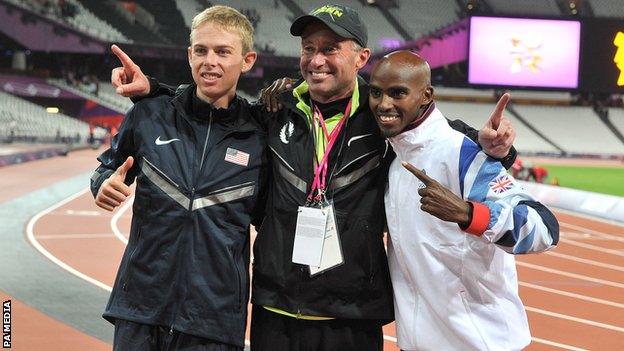Alberto Salazar: Ukad to investigate British Nike Oregon Project athletes
- Published

Salazar (centre) alongside Farah (right) and American training partner Galen Rupp at the London 2012 Olympics
Britain's anti-doping authority is to review whether it needs to take any action against athletes who trained with banned coach Alberto Salazar.
Salazar, the former coach of Britain's Mo Farah, was found guilty of doping violations after a four-year US Anti-Doping Agency investigation.
UK Anti-Doping (Ukad) says it will work with the World Anti-Doping Agency in its investigation into the 61-year-old.
American Salazar has already said he will appeal against his four-year ban.
In a statement, Ukad chief executive Nicole Sapstead said: "We have been working with Usada on their investigation into the Nike Oregon Project and will work with Wada on their investigation if there is any evidence that relates to athletes or athlete support personnel under our jurisdiction.
"We are reviewing the decision regarding Alberto Salazar to determine if there is any action we may wish to take as a national anti-doping organisation."
The Nike Oregon Project, run by Salazar, was established in 2001 and was the home of four-time Olympic champion Farah between 2011 and 2017.
It was closed down by Nike last month as the Salazar situation had become "an unfair burden" on athletes on the elite training programme.
Nike has stressed that Usada's report had not found evidence of performance-enhancing drugs being used on or by NOP athletes.
Farah has never failed a drugs test and has always strongly denied breaking any rules. He has said he is happy for any of his samples to be retested.
In 2017, Ukad declined a request from Usada to hand over Farah's historic drugs-test samples so that those of NOP athletes could be reanalysed.
Ukad said it was concerned such samples can degrade if retested or sent to a different location, undermining any future reanalysis.
Earlier this week, Wada president Sir Craig Reedie said his organisation will investigate all athletes who trained with Salazar.
However, head of Usada Travis Tygart has told BBC Sport that the global anti-doping watchdog should have acted quicker.
"I think their silence on the matter from the very beginning until they made a statement about athletes was troubling," he said.
"You would have liked to have seen the global regulator similarly take a position that whether Nike - or any other corporate sponsor of sport - is doing experiments with testosterone on their campus like the case demonstrated, and a coach, a consultant is found to have committed anti-doping offences and they state that that's a good thing for sport.
"But there was nothing but silence coming out of Wada. And then suddenly to hear these comments in the press for the first time was a little startling, quite frankly."